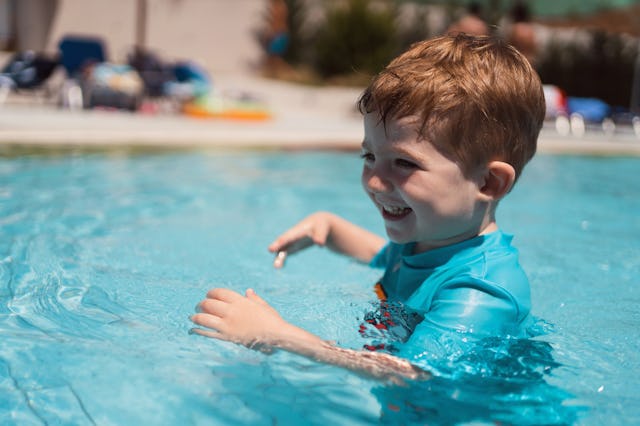TikTok's Summer Parenting Hack Involves Putting A Playpen In A Pool, But Is It Actually Safe?
Friendly reminder that not everything you see on TikTok is a good idea, especially when it comes to water safety.

As you gear up for a summer of fun with your little ones, you most certainly have water safety top of mind. At the risk of being alarmist, drowning can happen in a matter of seconds. In fact, drowning is the leading cause of death among kids aged 1-4, so keeping eyes on your kids at all times at the lake, pool, or ocean is of utmost importance.
A recent TikTok clip making the rounds sparked a conversation about swim safety, reminding parents and caregivers just how crucial it is to take safety seriously. In the video, a mom showed off a "parenting hack" involving putting an indoor playpen into an in-ground pool, with two little tots standing upright in the floating playpen as water floods in beneath their feet.
The clip garnered nearly three million views and more than 151,000 likes, but fellow TikTokers and pediatricians alike quickly began responding to the video, sharing why it's not a safe move no matter how closely you're watching your kids in the water.
It went so viral, in fact, that the National Drowning Prevention Alliance (NDPA) released a statement in response to the hack, with the executive director of the NDPA, Adam Katchmarchi, Ph.D., writing: "We implore all parents to disregard this message, and not put playpens in any body of water. This is not a recommended water safety measure and could put a child at an increased risk of drowning."
Scary Mommy checked in with a pediatrician, who told us, point blank, "There are no hacks for pool safety."
Elaborates Dr. Rajitha Julapalli, board-certified pediatrician at Pediatrix Primary + Urgent Care of Texas, "Putting a playpen into a pool is not safe at all. Children can die in as little as two inches of water. With the playpen, children can fall, or a side can buckle, and too much water can get in, which makes this very unsafe and potentially deadly."
The risks of the playpen migrating to the deep end of a pool, filling with water too quickly, tipping over, or coming apart are just too high, and it's in no way worth the potential safety hazards that can happen within minutes or even seconds, says Julapalli. You won't want to try this even in a smaller body of water, such as a kiddie pool or hot tub, as the same risks would still apply.
So, how can you keep your little ones safe this summer? The NDPA recommends adhering to the Five Layers of Protection, which include five checkpoints you'll want to have on hand to help prevent water-related injuries or deaths:
- Ensure you've got four-sided fencing with self-closing, self-latching gates, pool safety covers, and alarm systems to ensure a child or unauthorized adult cannot access the water unsupervised.
- Teach every adult and child basic water competency skills, which Julapalli suggests as well. The American Academy of Pediatrics recommends swim lessons from age one, but you can check in with your pediatrician at any age to see if your child is ready.
- Similarly, adults should be certified in CPR and basic water rescue skills, which will help reduce panic or confusion in the event of an emergency.
- The NDPA also advises putting your child in a lifejacket approved by the U.S. Coast Guard as an additional precautionary measure. Julapalli recommends that every child who doesn't know how to swim should wear one at all times near the water.
- And perhaps most importantly, the fifth layer of protection is supervision, which means at least one adult is vigilant and aware of all children at all times. "Children should be at arm's reach of an adult at all times in any body of water, including bathtubs, swimming pools, lakes, and oceans," says Julapalli.
Need a few pediatrician-recommended ideas for safe water play for little ones? "For toddlers, sprinklers and splash pads are good options for water play. There are many fun water toys, floats, and even waterproof books that you can play with alongside your child in the water. Adults can take turns being 'water watchers' with other adults to give each other a break."
The TL;DR here, per Julapalli: "Summer is a great time to spend with your child in the water," but she reiterates, "There are no hacks for pool safety, no matter what you see on TikTok."